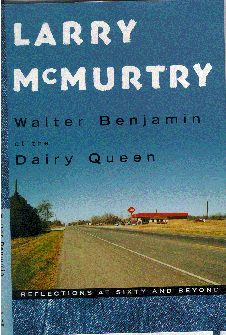
Walter Benjamin At The Dairy Queen, is another of Larry McMurtry’s slight semi memoirs which pop up in this column with the regularity of crab grass. Unlike some of the others though, this was actually a pretty good read. Eschewing the purposeful aloofness that plagues his later memoirs, Walter Benjamin finds McMurtry fully engaged, or at least as fully engaged as the laconic McMurtry allows himself to become.
Using the famous Essay on the death of the storyteller as a jumping off point McMurtry explores the vagaries of his life and art. A lot of this is material and anecdotes that I’ve read before, though this is as much my fault as McMurtry’s as he had the wisdom to put years in between these slight little reflections, and I have perhaps unwisely chosen to read them all in close proximity.
Still he seems more invested in their telling this time around. So if you insist on reading one of McMurtry’s nonfiction work, you could do worse then this one.
…

The Seventh isn’t quite the bold reinvention that Stark seemed to promise at the end of The Jugger. Despite the huge loss that Parker suffered at the end of that novel, he finds himself back on familiar ground at the beginning of The Seventh, relaxing in the aftermath of a heist.
The Seventh ends up being a fulfillment in a more important way though, creating for the second time in a row a Parker who is truly out of his element. In the field Parker is meticulous, leaving nothing to chance and indeed the heist in The Seventh goes off like clockwork. Its in the aftermath, when the loot is stolen in conjunction with a random crime that things go awry. As in The Jugger the real problem is good ole human stupidity. Which is something not even Parker can guard against.
What proceeds is such a slapstick tragedy of happenstance that it reads almost like the most ghastly Dortmunder book ever written, rather then the usual Parker novel.
…

Catching Fire the middle installment in The Hunger Games, aka the young adult sensation that’s actually good, carries over a lot of the same problems that the first installment did.
The first person present tense prose is distracting and declarative. The world Katniss inhabits is a patchwork one with pieces cribbed whole cloth from Battle Royale, 1984, V For Vendetta and The Chrysilads. Added to the problem is the fact that this feels like two books crammed uncomfortably into one. The first about the formenting revolution, which isn’t given nearly enough time, breathing room, or for that matter evidence to feel organic. The second the return to the arena which just feels like a rushed “greatest hits” version of the first installment.
But, and this is a big but, it doesn’t really matter. For all the flaws and nitpicks Catching Fire remains as propulsive a read as the first installment. And even if the world is cribbed it does so with a savagery and intent that honors its influences. It earns them, it doesn’t just parrot them.
The Games may not be perfect, but unlike a lot of the young adult dreck out there it feels like Fuel for the imagination not an anesthetic for it. Ideally it’ll act as a primer, leading the reader to other greater works, and in all fairness that’s exactly what it promises to do.
…

I reread Gone Baby Gone in preparation for my screening of it. I don’t want to talk about it too much right now, I said a lot of what I have to say about the novel in this article and I plan on revisiting the entirety of the Kenzie and Gennaro series in the run up to Moonlight Mile, so I want to save some of my comments for then.
Suffice to say Gone Baby Gone remains a brutally moving novel. The dark beating heart of the Kenzie and Gennaro saga and a master class in crime fiction. Dennis Lehane is a God.
Yes that’s a recommendation.
…
 The Corrections is a Literary novel with a capital L. A densely packed encoded work that pulls off the difficult task of being just as clever as it thinks it is. It would be tempting to cosign it to the genre of “Horrible People Doing Terrible Things.” But the remarkable thing about it is that every time you’re sure that its about to overplay its hand and dip into distasteful miserabilism, it somehow manages to pull back and keep its balance with humanity and grace.
The Corrections is a Literary novel with a capital L. A densely packed encoded work that pulls off the difficult task of being just as clever as it thinks it is. It would be tempting to cosign it to the genre of “Horrible People Doing Terrible Things.” But the remarkable thing about it is that every time you’re sure that its about to overplay its hand and dip into distasteful miserabilism, it somehow manages to pull back and keep its balance with humanity and grace.If this seems a slight review, that’s because it is. The Corrections is the type of novel one writes about in a fifty page dissertation or a blurb, the middle ground does not satisfy, and I have not the time for a fifty page dissertation. It’s a witty, literate, moving novel that manages to fit in more unhappiness per square inch of page then anyone since Chekov. And its more or less as good as you’ve heard.
…
And remember I also read An Object Of Beauty (Yay), The Fall (yay) and Tales Of Woe (Fuck you).




































































































